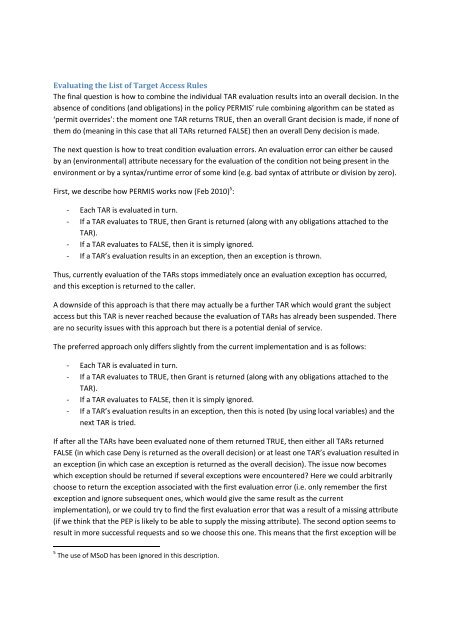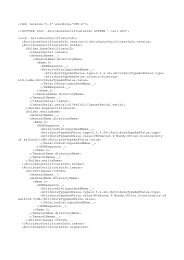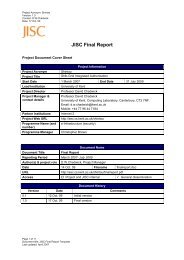Decision Making in PERMIS
Decision Making in PERMIS
Decision Making in PERMIS
You also want an ePaper? Increase the reach of your titles
YUMPU automatically turns print PDFs into web optimized ePapers that Google loves.
Evaluat<strong>in</strong>g the List of Target Access Rules<br />
The f<strong>in</strong>al question is how to comb<strong>in</strong>e the <strong>in</strong>dividual TAR evaluation results <strong>in</strong>to an overall decision. In the<br />
absence of conditions (and obligations) <strong>in</strong> the policy <strong>PERMIS</strong>’ rule comb<strong>in</strong><strong>in</strong>g algorithm can be stated as<br />
‘permit overrides’: the moment one TAR returns TRUE, then an overall Grant decision is made, if none of<br />
them do (mean<strong>in</strong>g <strong>in</strong> this case that all TARs returned FALSE) then an overall Deny decision is made.<br />
The next question is how to treat condition evaluation errors. An evaluation error can either be caused<br />
by an (environmental) attribute necessary for the evaluation of the condition not be<strong>in</strong>g present <strong>in</strong> the<br />
environment or by a syntax/runtime error of some k<strong>in</strong>d (e.g. bad syntax of attribute or division by zero).<br />
First, we describe how <strong>PERMIS</strong> works now (Feb 2010) 5 :<br />
- Each TAR is evaluated <strong>in</strong> turn.<br />
- If a TAR evaluates to TRUE, then Grant is returned (along with any obligations attached to the<br />
TAR).<br />
- If a TAR evaluates to FALSE, then it is simply ignored.<br />
- If a TAR’s evaluation results <strong>in</strong> an exception, then an exception is thrown.<br />
Thus, currently evaluation of the TARs stops immediately once an evaluation exception has occurred,<br />
and this exception is returned to the caller.<br />
A downside of this approach is that there may actually be a further TAR which would grant the subject<br />
access but this TAR is never reached because the evaluation of TARs has already been suspended. There<br />
are no security issues with this approach but there is a potential denial of service.<br />
The preferred approach only differs slightly from the current implementation and is as follows:<br />
- Each TAR is evaluated <strong>in</strong> turn.<br />
- If a TAR evaluates to TRUE, then Grant is returned (along with any obligations attached to the<br />
TAR).<br />
- If a TAR evaluates to FALSE, then it is simply ignored.<br />
- If a TAR’s evaluation results <strong>in</strong> an exception, then this is noted (by us<strong>in</strong>g local variables) and the<br />
next TAR is tried.<br />
If after all the TARs have been evaluated none of them returned TRUE, then either all TARs returned<br />
FALSE (<strong>in</strong> which case Deny is returned as the overall decision) or at least one TAR’s evaluation resulted <strong>in</strong><br />
an exception (<strong>in</strong> which case an exception is returned as the overall decision). The issue now becomes<br />
which exception should be returned if several exceptions were encountered Here we could arbitrarily<br />
choose to return the exception associated with the first evaluation error (i.e. only remember the first<br />
exception and ignore subsequent ones, which would give the same result as the current<br />
implementation), or we could try to f<strong>in</strong>d the first evaluation error that was a result of a miss<strong>in</strong>g attribute<br />
(if we th<strong>in</strong>k that the PEP is likely to be able to supply the miss<strong>in</strong>g attribute). The second option seems to<br />
result <strong>in</strong> more successful requests and so we choose this one. This means that the first exception will be<br />
5 The use of MSoD has been ignored <strong>in</strong> this description.



 "
>
"
>


